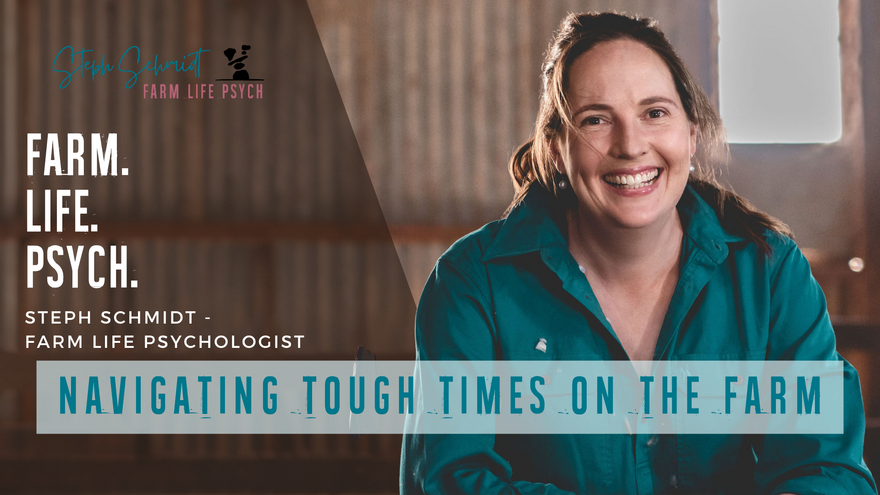Navigating Tough Times on the Farm

It's no secret that life on the farm comes with its fair share of ups and downs, moments of achievement and success alongside times of intense struggle. If you’re a farmer in South Australia, like I am, you’ve likely felt like the past six months have been a rollercoaster where the ups have steadily faded. This past week, in particular, has been the icing on the cake that none of us wanted to eat. The severe dry conditions and some severe frosts across the state have placed immense pressure on our crops and, by extension, our mental and emotional resilience.
It’s time to have some real talk about how to navigate through our current realities. Here are three important lessons I try to remember and practice in my own life on the farm. Shared in hopes that it might offer a bit of solidarity, comfort, or perhaps a new perspective.

1. Validate Your Emotions
One of the most important lessons is to acknowledge your feelings fully. When my husband and I realised that even our best crop had been badly impacted, my initial response was deep frustration and disappointment. These feelings, whether frustration, sadness or even anger, are our body's natural reactions to difficult situations. We don’t need to banish them in favour of forced optimism or push them down in fear of appearing weak. Instead, allow yourself to sit with these emotions momentarily. Recognise them for what they are—an essential part of the human experience in reaction to stressful events.
As I mentioned in the podcast, validate what you're feeling without letting it consume you. Understand that having these emotions is okay, especially in light of the season we are navigating through. By simply noticing and naming these feelings without judgment, you put yourself in a better position to manage them rather than being managed by them.
2. Prioritise Relationships
Stressful times often lead to tense moments within relationships, whether with your partner, family, or friends. Farming can indeed make or break these relationships, as everyone involved is likely experiencing elevated stress levels. My own experience this past week is a testament to this: simple conversations can quickly escalate into arguments when we don’t address the underlying tensions.
One practical strategy that I find invaluable is fostering a lens of curiosity and compassion. When stress levels run high, our brains are wired to perceive neutral expressions or comments negatively. Understanding this and making a concerted effort to approach each other with kindness can drastically improve interactions. More importantly, focus on repairing any ruptures that occur. After snapping at each other in the sheep yards, a simple, heartfelt apology “I’m sorry I snapped earlier”, and acknowledgment of shared stress “It’s not you, it’s how I’m feeling right now” went a long way in mending the rift.
3. Embrace Radical Acceptance
Among the many psychological strategies for coping with uncontrollable events, radical acceptance stands out as both incredibly challenging and immensely beneficial. Our natural inclination when faced with adversity is to resist and attempt to change our circumstances. However, some situations are entirely beyond our control—like the drought and frost we are currently experiencing.
Radical acceptance doesn't mean passivity or surrender. It’s not throwing your hands in the air, or throwing in the towel. Instead, it involves recognising what is beyond our control and letting go of the unhelpful struggle against it. It’s acknowledging that, while we cannot change the dry conditions or reverse the frost damage, we can direct our energy toward constructive actions and thoughts. This acceptance frees up emotional resources, allowing us to take proactive steps forward rather than remain paralysed by the “what-ifs” and “should-have-beens.”
While it sounds simple, embracing this mindset is anything but easy. It runs counter to our problem-solving nature. However, it is a powerful tool to reduce suffering and build emotional resilience—a strength we all need in farming.
At the simplest level, radical acceptance might look like saying to yourself, “This is hard”, “everyone would struggle with this”, and then allowing yourself space to consider the most helpful step you can take next.
Listen to this Episode 9 of Farm Life Psych with Steph Schmidt -
Moving Forward
The next 12 months will continue to be challenging for farmers across South Australia, with an incredibly challenging next six months. Financial decision-making, budgeting, and physical determination are all important - however, even more importantly, we need to strengthen our emotional and mental toolbox. By validating our feelings, prioritising our relationships, and embracing radical acceptance, we arm ourselves with essential tools to navigate through. Remember, you are not alone in this journey. As we take one day at a time, let’s share these lessons and support each other in every way we can.
Take care of you,
Steph Schmidt


0 comments
Leave a comment
Please log in or register to post a comment